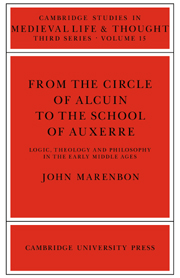 From the Circle of Alcuin to the School of Auxerre
From the Circle of Alcuin to the School of Auxerre Published online by Cambridge University Press: 24 October 2009
I have argued above that the problem of Universals in the early Middle Ages was part of a larger complex of problems, which can be finally traced back to Aristotle's Categories. The present chapter forms a necessary introduction to the detailed studies of early medieval thought and thinkers which follow. I shall begin by offering an abstract of the various patterns of interpretation to which the Categories lends itself. I shall then consider which earlier discussions of the Categories, and which versions of the Categories itself, were available in the early Middle Ages. Finally, I shall summarize the arguments of these sources and indicate their implications. In this way, it will be possible to gain the fullest and clearest impression of the complex of problems related to the Categories, as it presented itself in the early Middle Ages.
In the Categories, Aristotle divides ‘things said without any combination’ into ten classes: usia, quantity, qualification, relation, place, time, being-in-a-position, having, doing and being-affected. By ‘things said without any combination’, Aristotle means, as he explains at the beginning of the work (IaI6), terms such as ‘man’ and ‘runs’ as opposed to ‘man runs’. The Categories is a discussion of these ten classes, although the treatment of the final six is cursory; a consideration of opposition, priority, simultaneity and change concludes the book. The designation of the nine latter categories is self-explanatory; that of the first, usia, requires definition.
To save this book to your Kindle, first ensure [email protected] is added to your Approved Personal Document E-mail List under your Personal Document Settings on the Manage Your Content and Devices page of your Amazon account. Then enter the ‘name’ part of your Kindle email address below. Find out more about saving to your Kindle.
Note you can select to save to either the @free.kindle.com or @kindle.com variations. ‘@free.kindle.com’ emails are free but can only be saved to your device when it is connected to wi-fi. ‘@kindle.com’ emails can be delivered even when you are not connected to wi-fi, but note that service fees apply.
Find out more about the Kindle Personal Document Service.
To save content items to your account, please confirm that you agree to abide by our usage policies. If this is the first time you use this feature, you will be asked to authorise Cambridge Core to connect with your account. Find out more about saving content to Dropbox.
To save content items to your account, please confirm that you agree to abide by our usage policies. If this is the first time you use this feature, you will be asked to authorise Cambridge Core to connect with your account. Find out more about saving content to Google Drive.